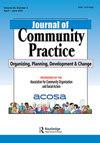通过青年生态活动家的叙述共同设想社会生态转型:走向生态正义的关系方法
IF 1.2
Q2 SOCIAL WORK
引用次数: 1
摘要
本研究利用干预研究第一阶段收集的定性数据,从青年生态活动家的角度探讨了“社会-生态转型”(SET)的概念。作为社会和生态危机交叉的多层次方法,这一概念尚未从社会工作的角度进行检验,并且关于如何在非科学空间中使用和设想它的知识有限。考虑到需要增加青年对生态社会工作和气候治理的参与,我们采访了来自加拿大的青年生态活动家(N = 10),探讨他们对SET的定义,并更好地了解与气候变化和气候行动相关的青年特有问题。研究人员对其中的5名青年进行了焦点小组讨论,目的是利用他们的经验知识,共同完善基于运动和自然的项目的生态社会组成部分,并在研究的后续阶段实施。研究结果表明,年轻人特别关注转型的社会文化因素,因此扩大了目前对SET的理解。三个主要组成部分(交叉气候正义,代际盟友关系,基于地点的联系)被绘制出来,并揭示了合作,团结和联系是生态活动家叙事的核心。以青年的声音为中心,讨论了生态社会工作实践的关键考虑因素,从而展示了增加体验式学习以(重新)与自然和社区联系的必要性。提出关系生态正义的概念是为了捕捉关于生态中心主义/人类中心主义辩论的微妙的、非二分的立场,这是一种邀请重新谈判生态社会工作本体论边界的方法。本文章由计算机程序翻译,如有差异,请以英文原文为准。
Co-envisioning the social-ecological transition through youth eco-activists’ narratives: toward a relational approach to ecological justice
ABSTRACT Drawing on qualitative data collected during the first phase of an intervention-research, this study explores the concept of “social-ecological transition” (SET) from the perspectives of youth eco-activists. As a multi-level approach to intersecting social and ecological crisis, this notion has yet been examined from a social work viewpoint and limited knowledge is available regarding how it is being appropriated and envisioned in nonscientific spaces. Considering the need to increase youth participation in ecosocial work and climate governance, youth eco-activists from Canada (N = 10) were interviewed to explore their definitions of the SET and to better understand youth-specific issues related to climate change and climate action. A focus group was conducted with five of those same youth and aimed to foreground their experiential knowledge to collaboratively refine the ecosocial component of a sport and nature-based program, implemented at a subsequent phase of the research. Findings show that youth focus especially on socio-cultural elements of the transition, therefore expanding current understandings of the SET. Three main components are mapped-out (Intersectional climate justice, Intergenerational allyship, Place-based connections) and reveal that collaborations, solidarities, and connections are at the heart of eco-activists’ narratives. Key considerations for ecosocial work practice are discussed by centering youth voices, thus showcasing the need for increased experiential learnings to (re)connect with nature and community. The concept of relational ecological justice is proposed to capture a nuanced, non-dichotomic position concerning the ecocentrism/anthropocentrism debate, an approach that invites to renegotiate the ontological boundaries of ecosocial work.
求助全文
通过发布文献求助,成功后即可免费获取论文全文。
去求助
来源期刊

Journal of Community Practice
SOCIAL WORK-
CiteScore
2.40
自引率
18.20%
发文量
27
期刊介绍:
The Journal of Community Practice is an interdisciplinary journal grounded in social work. It is designed to provide a forum for community practice, including community organizing, planning, social administration, organizational development, community development, and social change. The journal contributes to the advancement of knowledge related to numerous disciplines, including social work and the social sciences, urban planning, social and economic development, community organizing, policy analysis, urban and rural sociology, community health, public administration, and nonprofit management. As a forum for authors and a resource for readers, this journal makes an invaluable contribution to the community"s conceptualization, applications, and practice.
 求助内容:
求助内容: 应助结果提醒方式:
应助结果提醒方式:


